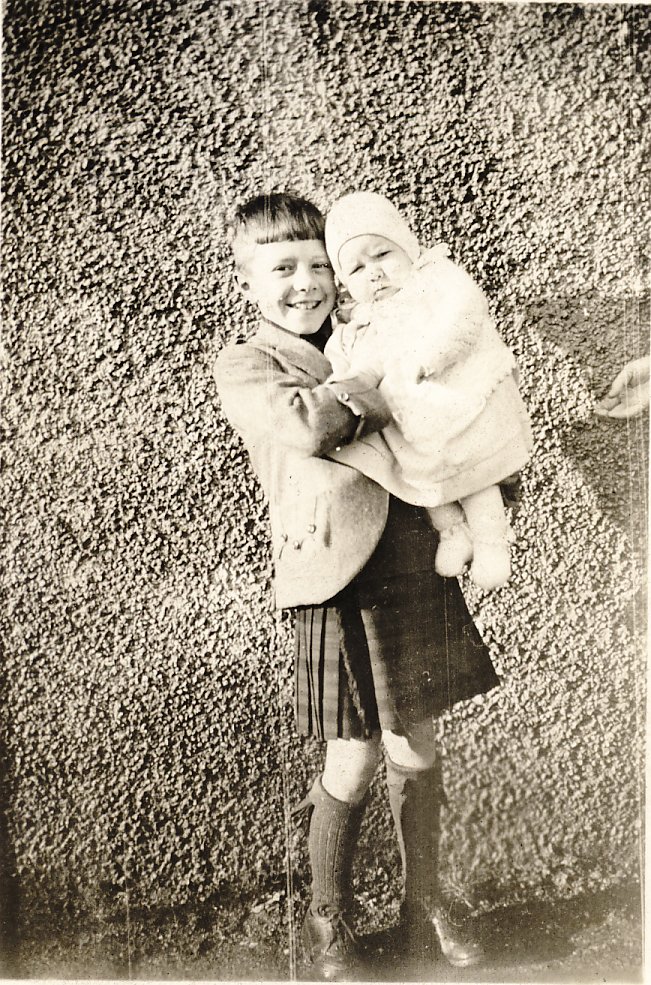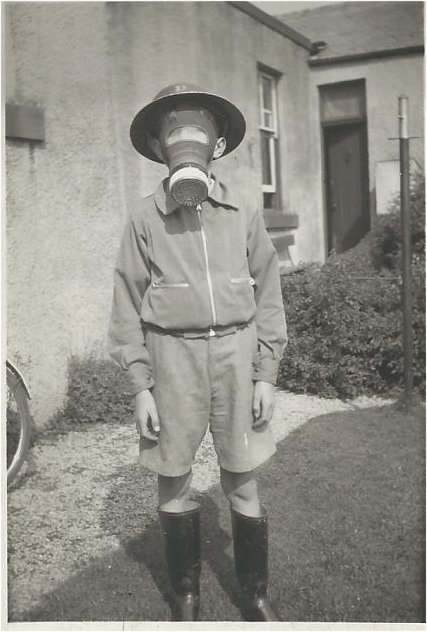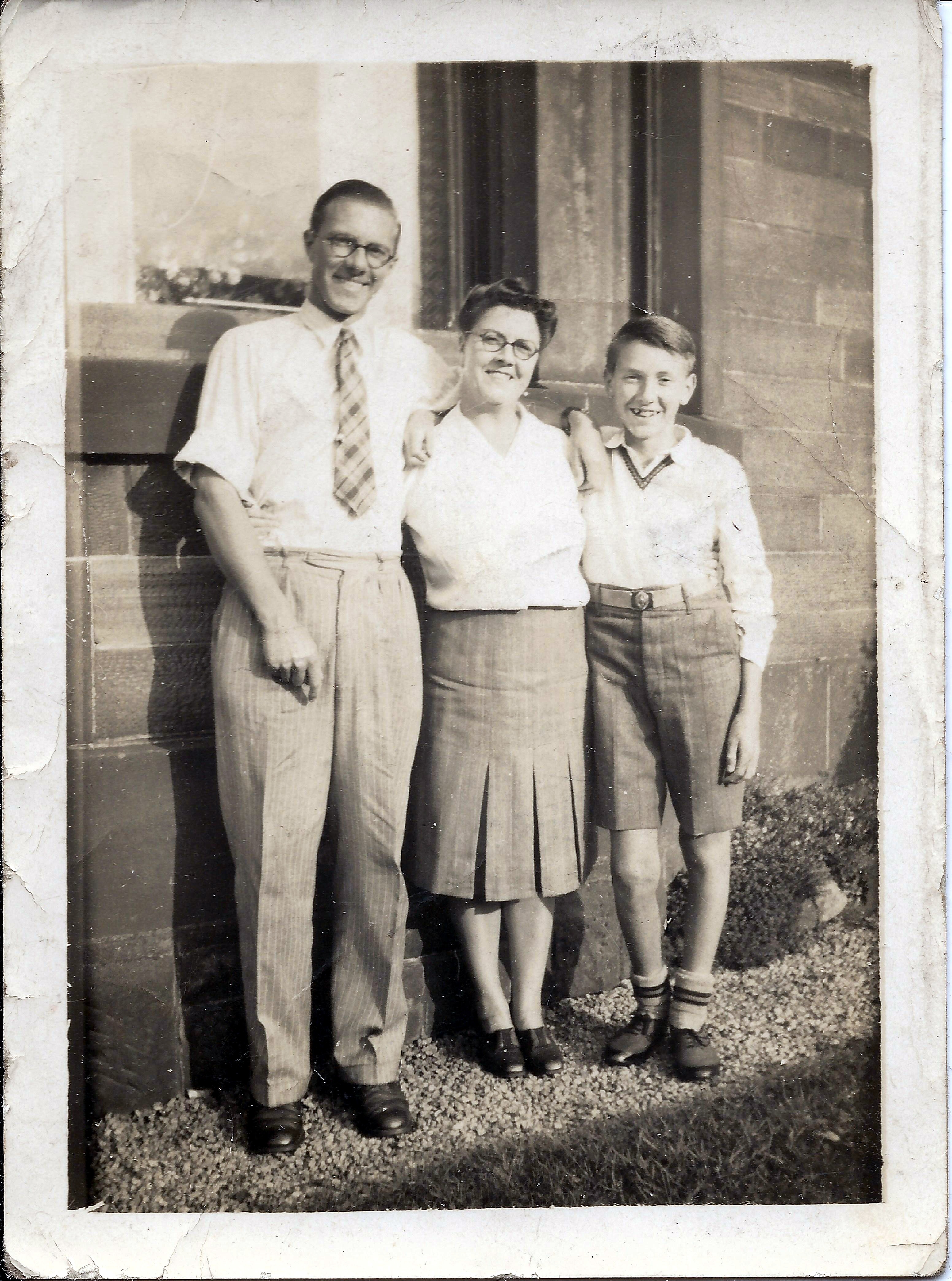The Penders - 1936 to 1955
The Penders - 1936 to 1955
Now there was a change around in the occupation of the house. In Grandda's will my mother was given the life rent of the house. May and John came downstairs to take possession of the kitchen, though they still slept in the back bedroom. May already had full control of the scullery. George, while he still had all his meals with the Pender family in the kitchen, took over the front bedroom as a bed-sittingroom, though Iain shared George's double bed there, and my cot was moved into the Wee room. This was the third bedroom, which only had a skylight as window.
In those pre-war days Glenpatrick Road had very little traffic. Young's, Western S.M.T. and Glasgow Corporation busses were the only real forms of transport through the village and they shuttled along the Main Road. Two Young's double-decker Busses brought a small proportion of the Carpet Field workers from and to Paisley morning and evening. The majority walked up and down Glenpatrick Road from and to the Main Road every day. Thus the road was a playground for the children. Iain and Billy Alston and myself from Glenpatrick Road, Robbie and Tom Barclay, Jim Young and Tom Wright from Greenhill Crescent and Sandy Forrest from Kings Crescent. One particular game I recall, which in these days would be suicidal was High Tig, in which you couldn't be tigged if you were standing up on a garden wall but only as you were running between walls. Thus you jumped down off a wall, dashed across the road and jumped up on the opposite wall. The closer you did this to the one who was "Het" (which was our word for “It”), the more daring you were. Nowadays the kids seem to perform this same trick with busses and cars. I much prefer our way; where there was more chance of reaching maturity. Of course the other reason you couldn't play High Tig now is that as you jumped for coping of the wall you reached for the top of the railings to help you up. These railings were all cut off at the start of the War as scrappy-iron for the War effort. It seems that in fact this scrap was never used and was dumped in some coup, at least that's the story. Other games we played were King Ball, Kick-the-can, Relievers and Roller-skate Hockey, as well as speeding around on our bicycles. Of course games like Cowboys and Indians and Cops and Robbers were played "up the Woods", this being the Newton Woods and the "Runnel" (the Roundhill Plantation) The Newton Woods were called variously the "Bluebell Woods" after the swathes of Bluebells which shot up every Spring, or the "Darkies" as the trees were mainly Scots Pines growing close together. One night in, I think, the 50's a fierce gale tore down a very large proportion of the trees letting in a lot more sunshine and ruining the aura of the Darkies. A propos the Bluebells, every year we would pick armfuls of them to take back to our mothers, but even when plunged straight into water they never seemed to last any time! Presumably the hot little hands were too much for the delicate growth. I don't recall ever being "bored" as the kids are said to be nowadays. If we got fed up playing one game we just sloped off to play something else.
When we weren't playing games we were following Crazes, These crazes seemed to follow each other through the year in no particular order. Stamps, Milk-bottle Tops, Conkers, Cigarette Cards, Dabbities. They all seemed to have their season. It was always my ambition to start a craze but I never managed it. When I brought out my Stamps everybody-else had Fag Cards, when I had my Milk-bottle Tops everybody-else kept playing with their Conkers. I bet Napoleon or Alexander the Great never had that problem. When Young Bonaparte brought out his fag-cards I bet all the other little Froggies ran home for their cards chucking their Milk-bottle Tops in the bin.
In September 1936 I started school just prior to my fifth birthday. I followed my big brother to the John Neilson Institution in Paisley. My first memory of that first day was at morning playtime. One of the other boys strode to the boys' lavatory (which was of course open to the skies. "A'm going to do a pee!" he said. I knew what the word meant but I had never before heard it spoken in public. It must have made a big impression on me because I have never forgotten that boy using that sweary word to this day!
My infants 1 teacher was Miss Peden. I don’t remember her trying to make me write with my right hand though it appeared it did happen. However my mother went in and tore her off a strip. "I was just trying to encourage him,” said the intimidated Miss Peden. "Well don't,” said Mum "He uses his left hand perfectly adequately, thank you". From then on, there was never any suggestion that I might be better off using my right hand. My mother might have left school at 14, but she wasn't going to let any teacher discipline me for no good reason! I was perhaps among the last of the left-handers to be "encouraged" to use the "good" hand. It has never failed to amaze me that prior to my going to school left-handers were made, by Fascist (i.e. Right-wing) right-handed teachers to write with their right hands. There was never any suggestion that it might be equally as good for the right-handers to be similarly "encouraged" to use their left hands. I understand that before my day left-handers were rapped across the knuckles for using their natural hand and ordered to use the "good" hand. It really is unbelievable. Mind you the steel nibbed pens which we were expected to write with were almost impossible to use with the left hand whilst writing from left to right, and I was always being chastised for poor writing. Not till the arrival of the Biro Pen in the late 40’s did my writing improve. (I wonder if Mr Biro was left-handed?) Even as late as 1976 I was asked by the medical officer at Moray House at the start of my teacher's training if I felt that my left handedness might be a handicap in teaching the children to use the tools. I laughed and said, "Why, do right handers have trouble then?" In the doctor's defence he did say, "Yes, unbelievable isn't, but I am expected to ask that of all left handers who pass through my office, so I just go through the motions!" I don't know if this is still reckoned to be a requirement for trainee Technical teachers of the present day!
My school career ended in 1949 when I left clutching my "highers" certificate and I started my Engineering Apprenticeship with A.F.Craig's "Caledonia" Engineering works in McDowall Street in Paisley. Craig's manufactured Sugar mill machinery, Oil refining plant, Steam raising Boilers, and Carpet weaving looms, both Wilton and Axminster. My first year apprentice pay was 29/6 a week (£1.47½) from which I paid 4/11 (24½) National Insurance contribution leaving a take -home pay of 24/7 (£1.23).
During that first week I was introduced to my Grandda Pender's cousin John Gardner known in the family as Jock the blacksmith. Jock had retired as a blacksmith by this time and was now Jock the Painter in Craig's, giving the oil refining equipment a coat of red lead paint prior to its going out the gate. Jock shook my hand and I remember thinking "So that's what a Masonic Handshake is like!" It wasn't until some time after that I learnt that at one point in his life Jock had had an accident at his work and had the middle finger of his right hand cut off! Hence the peculiar feel of his handshake!
Harking back to when the second War broke out, my brother Iain was about sixteen and so was too young for the forces. (Big sigh of relief from his Mum!). He did the next best thing and joined the ARP (Air Raid Precautions). He was too young to be an Air Raid Warden so they made him a Messenger. I can remember him jumping out of bed when the Air Raid Siren went off in the middle of the night, throwing on his uniform, slinging on his gas-mask haversack, fitting on his steel helmet with the capital M on the front, and cycling off down Glenpatrick Road to the ARP post. I never did know exactly what his duties were or how much of them he carried out, I was just proud that my big brother was doing his bit for king and Country.
Iain completed his schooling in 1940 being awarded the “Neilsonian” prize as Proxime Accessit to the Dux of the school. He started at Glasgow University that same year, and presumably resigned from the ARP at the same time, because he, there, joined the University OTC which at that time was part of the Home Guard. Normally the OTC would have been the stepping stone to a commission in the Army, but his Chemistry degree meant that he was much more use to the war effort in industry than in the forces.
He didn’t have very long holidays whilst at University. Because of the need for trained graduate chemists the holidays were cut to the minimum and four years’ study was crammed into three years at the successful completion of which he was granted a “War honours” degree. Only the youngest of the year were allowed to continue for a fourth “Honours” year. Even in the short summer holidays he was directed to work in the explosives factory in Bishopton just north of Paisley.
When he had completed his studies in 1944, he was offered, by the Ministry of labour, the choice of three jobs in industry from which he chose the post of junior chemist in the Glaxo factory in East London working on the production of Penicillin. He stayed with Glaxo till 1948 during which time he attended evening classes to study Chemical Engineering and successfully took the examinations to qualify for Associate Membership of the Institution of Chemical Engineers. The company had started up a new factory for Penicillin production in Barnard Castle in Yorkshire and in 1948 wanted Iain to transfer there.
By this time however, Iain was a real Metropolitan and he couldn’t stand the thought of being exiled to the wilds of the Yorkshire Dales so he resigned from Glaxo and almost immediately joined The Royal Dutch Shell Oil Co. with which company he spent the remainder of his working life.
He started work with Shell in their refinery in Stanford-le-Hope in Essex. Late in 1952 the company wanted to transfer Iain to their refinery in Suez in Egypt. Early in January 1953 he and his girlfriend Peggy Welsh were married, and shortly thereafter the happy couple went off together to start their married life in Egypt. The rest is history……..
Had Iain not had a hankering to be a chemistry teacher he would probably not have gone to University and I would have ended up as an Engineering Draughtsman. However as a Graduate Chemist Iain suggested to the family that with my maths, physics and chemistry highers, I should follow him to University to study Chemical Engineering, and the money was found for me to spend the next four winters at the Uni. and the Royal Technical College.
Notes:
"Dabbities"… I believe they are still around today; paper-backed pseudo tattoos which you wet and pressed on to the back of your hand then carefully peeled off the paper leaving a little picture.
"Milk bottle tops"… In those days milk bottles had larger tops than today and were sealed with grease-proofed cardboard tops with a push out centre for the insertion of a drinking straw. Every schoolchild paid a halfpenny each morning for a bottle (1/3 of a pint) to drink at morning break i.e. Playtime. By putting one’s forefinger in the centre hole and holding the top with middle finger and thumb, it was possible to skim the top for a considerable velocity through the air. Other games were played such as two or more boys tossing their tops at the bottom of a wall, the boy whose top was closest to the wall collected all the tops. He then had to bend his elbow with the palm of his hand uppermost, balance the bottle tops on his upturned elbow, and with a quick flick, attempt to catch the tops in his hand. He was allowed to keep the tops he caught. I have seen boys now-a-days playing the same game with money. We never had more than our bus fare in our pocket, so playing for money was just never thought of!




